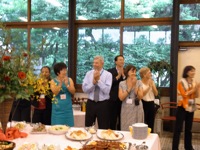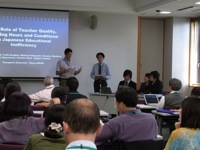About JUSTEC
 |
 |
|
The
Japan-U.S. Teacher
Education Consortium (JUSTEC) was established in the late 1980s by
several deans of education at universities in the United States and in
Japan in the interest of fostering joint research efforts into teacher
education issues of mutual interest in both countries. The original
founding universities in the U.S. were: Stanford University, Vanderbilt
University, Columbia University, University of Hawaii at Manoa,
University of Washington, University of Minnesota, University of
Indiana, San Diego State University, Michigan State University, Ohio
State University, and NewYork City University.
The original founding universities in Japan were : University of Tokyo,
Kyoto University, University of Tsukuba, Tokyo Gakugei University,
Chiba University, Aichi University of Education, Hiroshima University,
Hyogo University of Teacher Education, Waseda University, and Tamagawa
University.
The
organization was established under the aegis of AACTE (American Association
of
Colleges for Teacher Education) and, though it has evolved from
being
dean-centered to being faculty/researcher-centered over the years,
JUSTEC had continued to hold annual conferences of teacher education
professionals in alternate locations in the U.S. and Japan until JUSTEC
2018, the 30th Anniversary. At the 30th
Anniversary in 2018, the
governing board members discussed and agreed to the basic rule of a
minimum interval of 1 year between JUSTEC conferences to renew JUSTEC
even better. For much of
its history, the meetings were sponsored by AACTE and supported
by AACTE staff. AACTE’s longtime Executive Director, Dr. David Imig(Professor,
University of Maryland and College Park, President and CEO Emeritus of
AACTE)
played a key role in the establishment and continuing operation of
JUSTEC by publishing notices of the annual meetings, dedicating staff
to supporting the planning and resourcing of the meetings, and
attending and participating in the meetings every year until his
retirement. Since 2007, JUSTEC has continued as an independent
organization of interested faculty and universities.
Objectives:
- To provide opportunities for colleges and graduate schools of education to examine their study and practice.
- As an incubator for new ideas, to provide opportunities to give presentations and to engage in discussion and cultural exchange for scholars, graduate students, in-service teachers, policy makers and others who are involved in education.
- To facilitate joint study and collaborative projects between US and Japanese scholars/educators and to support scholars’ and practitioners’ efforts towards better education.
- To enhance academic networks between Japan and US scholars, educators, and practitioners.
In
the history of JUSTEC, JUSTEC 2010 was a
special convocation, as it marked the beginning of a renewal for
JUSTEC. This year, Tamagawa University (Tokyo) and University of Puget
Sound (Tacoma) became the official hub universities for JUSTEC in Japan
and the U.S. In addition, JUSTEC 2010 has gained the support of the
American Embassy in Japan; the Ministry of Education, Culture, Sports,
Science, and Technology, Japan (MEXT); the Japan Educational
Administration Society; the Japanese Association for the Study of
Educational Administration; the Japan Society for the Studies on
Educational Practices; and the Japan Association for Emotional
Education; thereby providing particular educational benefits for
Japan-US educators. In addition, the JUSTEC 2010 Forum invited a
featured keynote speaker, Dr. Marilyn Cochran-Smith, the Cawthorne
Professor of Teacher Education for Urban Schools and Director of the
Doctoral Program in Curriculum and Instruction at the Lynch School of
Education at Boston College (Boston, Massachusetts, USA). She is an
elected member of the National Academy of Education and a former
President of the American Educational Research Association (AERA). This
forum was supported by the Tokyo Metropolitan Board of Education, the
Kanagawa Prefectural Board of Education, the Saitama Prefectural Board
of Education, and 5 other City Boards of Education (Machida, Inagi,
Kawasaki, Sagamihara, Yokohama), as they consider JUSTEC to be highly
beneficial not only for scholars but also for their in-service
teachers.
The
JUSTEC
Seminar continues the tradition of Japanese and U.S. teacher educators
convening to promote understanding of and collaborative research into
education issues of interest in both Japan and the U.S. JUSTEC seminars
include interactive presentations by Japanese and American educators,
visits to area schools, formal and informal discussions among seminar
participants, and cultural activities.
Participation is open
to all members of the education community – college/university
administrators and faculty, PK-12 administrators and teachers, and
students from all levels. Active participation and discussion is
welcomed and encouraged, especially in the presentation of papers on
topics confronting both Japanese and U.S. Teacher Education. Efforts to
prepare paper/presentation handouts in both English and Japanese are
appreciated. The primary language for presentations at the seminar will
be English.
Previous Host Universities
As mentioned
above, the
governing board members discussed and agreed to the basic rule of a
minimum interval of 1 year between JUSTEC conferences to renew JUSTEC
even better after 2018.